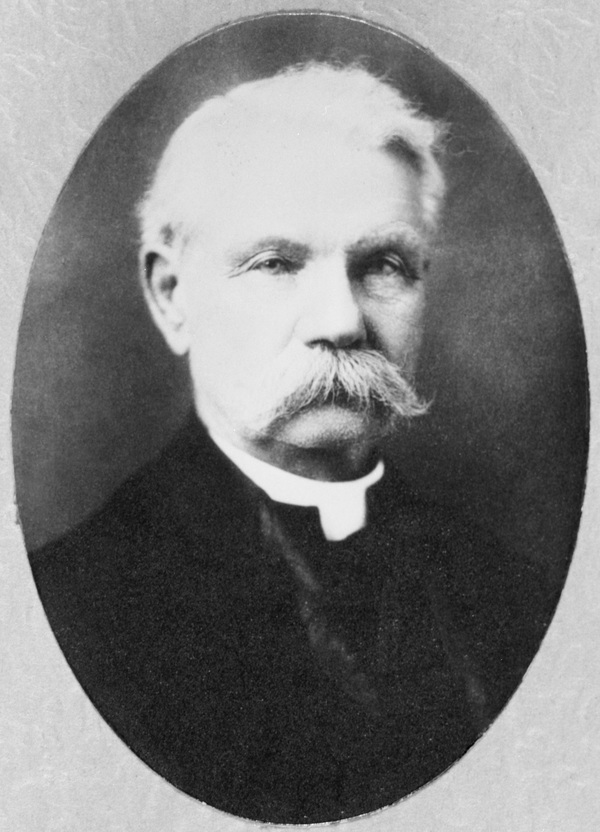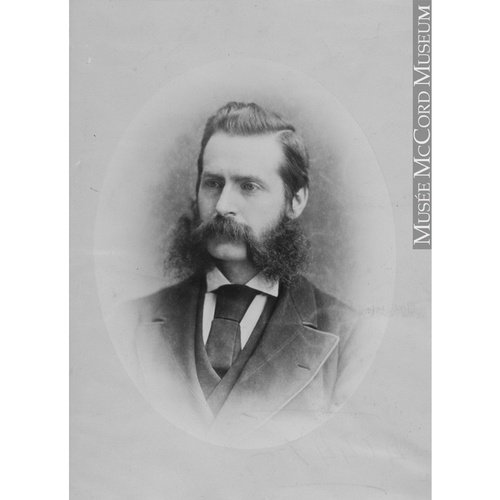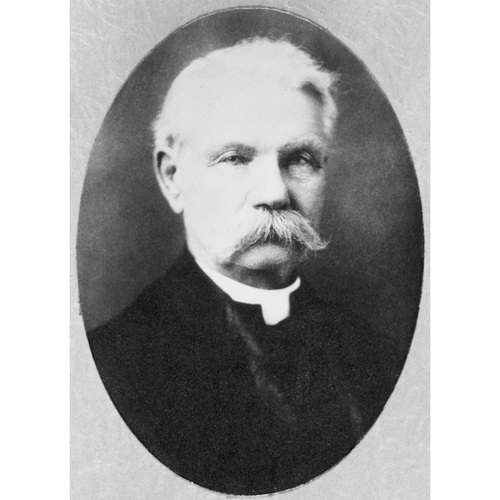
Source: Link
MACLEAN, JOHN (until about 1890 he spelled his family name McLean), Methodist missionary, author, office holder, newspaper editor, archivist, and librarian; b. 30 Oct. 1851 in Kilmarnock, Scotland, son of John McLean and Alice ———; m. 10 June 1880 Sarah Anne Barker in Guelph, Ont., and they had six children; d. 7 March 1928 in Winnipeg.
John Maclean pursued his education throughout his life. After attending an academy in Dumbarton, Scotland, he came to Canada in 1873. He was received on trial as a minister of the Methodist Church of Canada in 1875 and spent two years northwest of London, Ont., before entering Victoria College, Cobourg, where he earned a ba (1882) and an ma (1887). He went on to obtain a phd in church history from Illinois Wesleyan University in Bloomington in 1888 and an llb from the University of Manitoba in 1926. His doctoral degree made him the target of jealous criticism; some complained that his studying led him to neglect his mission. Maclean proceeded undaunted.
In 1880, after his ordination on 6 June and his wedding four days later, Maclean and his wife left for a new Methodist mission near Fort Macleod (Alta). They spent nine years among the Blood Indians, the North-West Mounted Police, and settlers; Maclean’s circuit comprised almost all of what is now southern Alberta. There, he learned the languages of many native groups of the foothills. Settlement and the drive to create Indian reserves and industrial schools in the west during the last quarter of the 19th century spawned competition among missionaries. Maclean plunged into an unpleasant rivalry with Samuel Trivett of the Church Missionary Society which lasted until his departure in 1889. At the mission Maclean experienced mixed reactions from the Blood, who welcomed his offerings of food, clothing, and education, but who sometimes destroyed his property.
In 1886 Maclean had been appointed public school inspector for a territory extending from Medicine Hat to the Rockies and from Fort Macleod to the United States. He resigned this post after joining the Board of Education of the North-West Territories on 2 Dec. 1887. Two years later Maclean was appointed a member of the board of examiners for teachers and after accepting a charge in Moose Jaw (Sask.), he moved there with his young family; they stayed until 1892. Maclean also held posts within the church. The Manitoba and North-West Conference elected him journal secretary (1888–91) and secretary (1892); he would become president in 1895. In addition, he would serve as president of the Prohibitory League in 1898.
Along with a small group of unconventional missionaries such as Silas Tertius Rand*, Émile Petitot*, and Adrien-Gabriel Morice*, Maclean had a keen interest in Indian culture and ethnology. He corresponded with such early ethnologists as Horatio Emmons Hale*, Franz Boas*, and James Constantine Pilling, with the British Association on North-West Indian Tribes from 1882 to 1888, and for many years with the bureau of ethnology of the Smithsonian Institution in Washington, D.C., on the languages and literature of the native peoples of the west. His contemporaries thought him well informed on the languages, culture, and social and political life of the Plains Indians. At his death three of his books, The Indians: their manners and customs (Toronto, 1889), The Blackfoot language ([Toronto?, 1896?]), and Canadian savage folk: the native tribes of Canada (Toronto, 1896), were considered the best on their subjects. Besides his many works on native peoples and missionaries, some of which were published under the pseudonym Robin Rustler, he published numerous ethnological pamphlets and he was a regular contributor to the Hudson’s Bay Company’s magazine Beaver (Winnipeg) from 1924 to 1927.
Although Maclean clearly adhered to contemporary theories about the vanishing Indian and was later criticized for superficial fieldwork, he treated native peoples as humans who were capable of spiritual depth and sincerity. On 10 April 1889, for example, he wrote to his wife: “Listening to the song and story of my dusky friends my heart is bounding with delight. . . . Like innocent children they asked me whether or not I had seen any buffalo. . . . The shadows are falling over their pathway. . . . And they bow to the inevitable lot imposed upon them by the white race . . . [they] await the time when the Great Spirit shall call [them] away.”
Maclean subsequently served at Port Arthur (Thunder Bay, Ont.) (1892–95), Neepawa, Man. (1896–1900), and Carman, Man. (1901–2). During those years he wrote a series of religious tracts. In 1902 he moved to Halifax, where he was editor of the Wesleyan for four years; he then returned west and was stationed at Morden, Man., until 1911. That year Maclean was sent to the small, struggling Bethel mission in Winnipeg. There, he and Sarah worked until 1919 among Winnipeg’s English-speaking poor, providing social, legal, medical, and other relief services. At Bethel, which was renamed the Maclean mission in 1918, the couple established a Sunday school and built a community centre, where an orchestra played a free concert every Saturday night.
In 1918 Maclean accepted the position of chief archivist of the Methodist Church at Wesley College, Winnipeg, a position which, from 1922, he held concurrently with that of chief librarian at the college. He would retain both posts until 1928. As archivist, he was especially interested in documenting the early history of the Methodist and Presbyterian denominations. He was active in many scientific and literary societies, including the Canadian Institute, the American Association for the Advancement of Science, the American Folk-Lore Society, the Historical and Scientific Society of Manitoba, and the Ontario Historical Society.
The 1920s were difficult for Maclean. The Winnipeg General Strike of 1919 had upset him greatly; he feared it to be the start of a revolution that was contemplated for the whole dominion. He was especially critical of the Social Gospel movement, believing that James Shaver Woodsworth* was supporting “Bolsheviks.” As the 1920s went on, despite his optimism over church union, he was pessimistic about what he viewed as the decline of Methodism. After his death in 1928 John Maclean was warmly remembered as a committed and passionate man who devoted himself completely to scholarship, especially on native languages and culture, and to the church.
John Maclean is the author of numerous works, some of which went through several editions. The online catalogue of the LAC has 80 entries under his name. A number of his publications can also be found in CIHM, Reg.
AO, RG 80-5-0-94, no.11978. LAC, MG 29, D65. UCC, Manitoba and Northwestern Ontario Conference Arch. (Winnipeg), Vert. file, John Maclean. UCC-C, Biog. file; Fonds 3270. Winnipeg Tribune, 19 May 1926. Canadian men and women of the time (Morgan; 1898 and 1912). G. H. Cornish, Cyclopædia of Methodism in Canada . . . (2v., Toronto and Halifax, 1881–1903). J. W. Grant, Moon of wintertime: missionaries and the Indians of Canada in encounter since 1534 (Toronto, 1984).
Cite This Article
Susan Gray, “MACLEAN (McLean), JOHN (1851-1928),” in Dictionary of Canadian Biography, vol. 15, University of Toronto/Université Laval, 2003–, accessed December 31, 2025, https://www.biographi.ca/en/bio/maclean_john_15E.html.
The citation above shows the format for footnotes and endnotes according to the Chicago manual of style (16th edition). Information to be used in other citation formats:
| Permalink: | https://www.biographi.ca/en/bio/maclean_john_15E.html |
| Author of Article: | Susan Gray |
| Title of Article: | MACLEAN (McLean), JOHN (1851-1928) |
| Publication Name: | Dictionary of Canadian Biography, vol. 15 |
| Publisher: | University of Toronto/Université Laval |
| Year of publication: | 2005 |
| Year of revision: | 2005 |
| Access Date: | December 31, 2025 |




